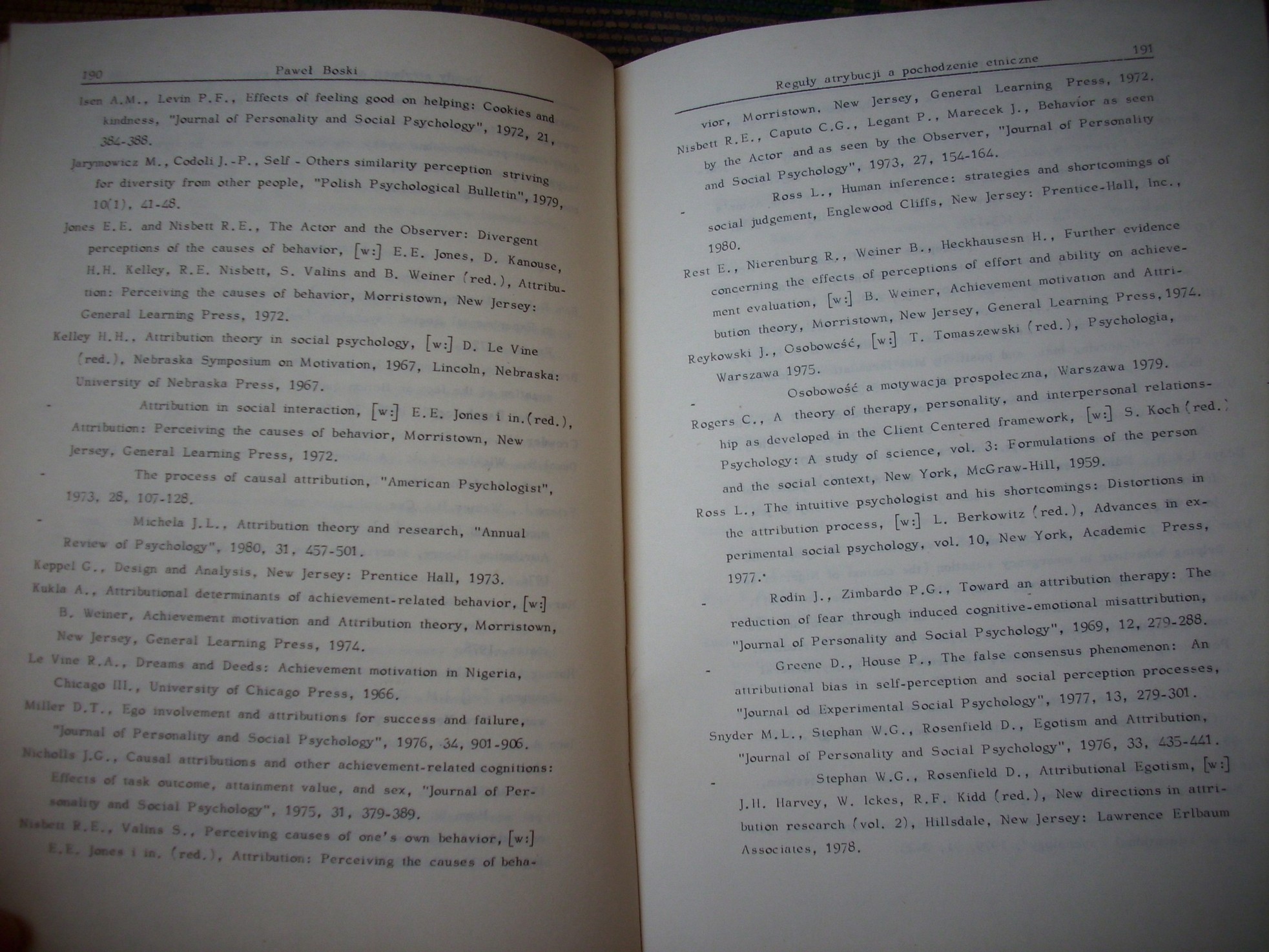Image00095

Paweł Boski
Igen A.M.. Lenn P. F.. Effects of feeling good on helping: Cookies and k indne ss, "Journal of Personality and Social Psychology", 1972, 21, 3&Ć.-388.
JaijBBOwicz M., Codołi J. -P.. Self - Others similarity perception striving for diversity from other people, "Polish Psychological Bulletin", 1979, 10(1). 41-d8.
Jones E.E. and Nisber: R.E., The Actor and the Observer: Divergent perceptions of the causes of behavior, [w:] E.E. Jones, D. Kanouse, H.H. Kelley. R.E. Nisbett, S. Valins and B. Weiner (red.), Attribu-tion: Perce:vmg the causes of behavior, Morristown, New Jersey: General Learnmg Press, 1972.
Keiley H.H.. Attribution theory m social psychology, [w:] D. Le Vine (red.). Nebraska Symposium on Motivation, 1967, Lincoln, Nebraska: Umverstty of Nebraska Press, 1967.
Attnbution m social interaction, [w:J E.E. Jones i in.(red.), A tm be non: Perceivmg the causes of behavior, Morristown, New Jersey, General Learnmg Press, 1972.
The process of causal atrribution, "American Psychologtst",
1973, 28, 107-128.
Michela J.L., Attribution theory and research, "Annual Review of Psychology", 1980, 31, £57-501.
Keppel C., Design and Analysis, New Jersey: Prentice Hall, 1973.
Kukla A., Ann bu nona 1 determinanta of achievement-related behavior, [w:]
B. Weiner, Achievement tnotivation and Attribution theory, Morristown, New Jersey, General Learnmg Press, 1974.
La Vtne R.A., Dreams and Deeds: Achievement motivation in Nigeria, Chicago 111., Uniwersiry of Chicago Press, 1966.
Miller D.T., Ego mrolrement and attributions for snccess and failure, "Jcremal of Personalny and Social Psychology", 1976 , 34, 901-906. KcMlli J.G.. Causal attributions and other achievemcnt-relatcd cognilipna: ŁJIetis of task outcome, attamment value, and sex, "Journal of Per-
ad Social Psychology", 1975, 31, 379-389.
jfc&.E., Valias S., Perceiving causes of onc’s own behavior, [w:] ^K| $ ka. (r*d,), Attnbution: Perceivmg the causes of beha-
vtor, Morristown. New Jersey, General Learning Press, 1912.
^jisbett R.E., Caputo C.G., Legant P., Marecck J., Behovior as socn by the Actor and as seen by the Observer, "Journal of Personality and Social Psychology", 1973 , 27, 15A-16A.
Ross L. , Humań inference: stratę gics and shortcoinings of social judgement, Englewood Cliffs, New Jersey: Prentice-lloll, Inc. ,
1980.
Rest E., Nicrenburg R., Weiner B., Heckhausesn H. , Further evidence concoraing the effects of perceptions of effort and ability on achicve-ment evaluation, [w:] B. Weiner, Achievement motivation and Attri-bution theory, Morristown, New Jersey, General Learning Press, 19/ć.
Rcykowski J. , Osobowość, [wij T. Tomaszewski (red.), Psychologia, Warszawa 1975.
- Osobowość a motywacja prospołeczna. Warszawa 1979.
Rogcrs C., A theory of therapy, personality, and interpersonal relations-hip as dovcloped in the Client Centered framework, [wi] S. Koch \.red. Psychology: A study of science, vol. 3: Formulations of the person and the social context, New York, McGraw-Hill, 1959.
Ross L. , The intuitive psychologist and his shorteomings: Distortions in the attnbution process, [w:] L. Berkowitz (red.), Advances in ex-perimental social psychology, vol. 10, New York, Academic Press,
1977.*
- Rodin J., Zimbardo P.G., Toward an attribulion therapy: The reduction of fear through induced cognitive-emotional misattribution, "Journal of Personality and Social Psychology", 1969, 12, 279-288.
- Grecne D. , House P., The false consensus phenomenon: An
attributional bias in self-perception and social perception processes, "Journal od Expcrimental Social Psychology", 1977, 13, 279-301.
Snydcr M.L., Stcphan W.G., Rosenfield D., Egotism and Attribution, "Journal of Personality and Social Psychology", 1976 , 33, *i35-£ćl .
- Stcphan W.G., Rosenfield D. , Attributional Egotism, [w:] J.U. Ilarvey, W. lckcs, R.F. Kidd (red.), New directions in attrt-bution reseorch (vol. 2), Hillsdale, New Jersey: Lawrence Krlbaum Associates, 1978.
Wyszukiwarka
Podobne podstrony:
Image00068 Paweł Boski 136 1.5. Problem wymiarów i klasyfikacji kategorii przyczynowychs wymiar
Image00079 Paweł Boski 15* fanza mtgrgsgjęicycfr dla teorii mechanizmów, ca roawws cc im» koweoom yr
Image00089 Paweł Boski 17S wielkość te; kste.com w całym zbiorze była znikoma, niezależnie od degra.
Image00093 Paweł Boski 186 me posiadamy wiedzy na temat Ich kultur etnicznych oraz profilów modal. n
Image00072 Paweł Boski 144 tendencja do przypisywania Innemu przyczyn niżej wartościowanych niż przy
Image00074 Paweł Boski ^ US Schemat 9 ilustruje zasadę testu. Przykłady zadań w Teście Substytucji
Image00075 Paweł Boski I5<* ty wynik *0* łP dla każdej z przyczyn ułamek ze 100% reprezentującyc
więcej podobnych podstron